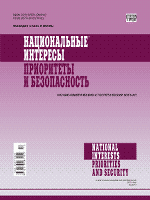Abstracting and IndexingРИНЦReferativny Zhurnal VINITI RAS Worldcat LCCN Permalink Google Scholar Online availableEastvieweLIBRARY.RU Biblioclub |
Evaluation of the industrial potential of Russia and the level of its use (imperative of modernizing industrial production)
Available online: 29 July 2014 Subject Heading: STRATEGY OF ECONOMIC ADVANCEMENT JEL Classification: Pages: 14-34
The article emphasizes that according to some experts, the Russian Federation is now a stable place in the global world economy, albeit low growth, but still the Russian economy is growing. Moreover, the observed slowdown of growth due to the internal problems of development is not the result of the past mistakes. But is it really so? What is the real situation in the economy? After all, there are fundamental differences between the ideas of liberalism and neo-liberal economic policies carried into practice in Russia. We cannot but agree with the conclusion that without counteracting market fundamentalism and neo-liberal policies, we are not able to avoid serious threats to Russia, as well as negative consequences. The paper assesses the Russian industrial potential and opportunities for its revival. The analysis of the economic development of the country is based on the most important indicators for the entire period of economic reforms. The author points out that the main conceptual strategy of the innovative development of the Russian industry may require the following provisions. Russia as a self-sufficient country should rely in its economic development at its own internal sources of natural resources and at its remaining industrial potential and its engineering should become the engine of development. It is necessary to use the innovation potential of military-industrial complex which basis offers the opportunity to work out a mechanism of accelerated development in mechanical engineering in general and also organize manufacture of dual-use products and diversification of a purely military production, the creation of a data bank for the use of the latest technology on a commercial basis in the business environment. Obviously, it is necessary to carry out the socialization (renationalization) of the basic economic activities (strategic activities, high-technology industries, base (mining) forms of production, fuel and energy complex and natural monopolies). The strategy of progressive (innovation) development should be based at the vertically integrated corporations, which interact on target priorities of state regulation of economic processes based on the nationalization of strategic sectors and industries. It is especially important to reunite and merge the two industrial sectors of the economy, precisely, mining and manufacturing industries. Under these circumstances and in view of the challenges facing Russia, these industrial sectors can be integrated only on the state-enterprise basis. Keywords: economy, stability, growth inhibition, neoliberal economic policies, market fundamentalism, threats, industrial potential evaluation, economic sectors revival References:
|
ISSN 2311-875X (Online)
|
|








